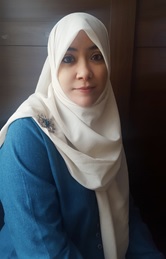In the words of Asia Alfasi: “Women are the silent unknown soldiers working and striving to hold their families together during times of war.”
Date:

“It was a great honor to be invited to take part in a project in which I feel passionately for the characters and their culture; and felt confident that I had the capacity to highlight their plight with the sensitivity and honesty they deserved,” says artist Asia Alfasi about her collaboration with UN Women.
Photo: Courtesy of Asia Alfasi
Born in Libya, award-winning artist and graphic novelist Asia Alfasi, migrated to Scotland with her family at the age of 7. After spending her early childhood in Libya, she landed in Glasgow, where she received her primary and secondary education. Having grown up in in a home full of Arabic-dubbed classic Japanese anime adaptations of the world's most famous novels, her work distils influences from the Islamic, Libyan and manga cultures. Alfasi, in collaboration with UN Women, created the animation “Into our own hands” which tells the story of two brave Iraqi women who flee conflict and overcome traditional gender roles to provide for their families.
At first, when I moved to Scotland, it was difficult trying to overcome the language and culture barriers, more so as I had nothing visual from my culture to show and share with my peers. That changed when I found an English copy of a manga I used to watch in Libya as a child. From then on, I began to draw characters and stories and watched as my Scottish peers' attitudes towards me changed from one of bullying to acceptance and even admiration. The change was so profound that it made me consider the power of art not only to educate but to bypass prejudice and extend bridges of understanding and mutual respect between vastly different people.
It is no secret that the Middle East is undergoing a time of great turbulence and instability; it has often irked me that there is seldom a representation of Arabs (and perhaps Muslims?) that doesn't use cultural and religious differences to present their experience. It is very important to have stories and works that humanize the characters and show from a very human point of view the struggles and challenges they face and the decisions they are often forced to take during unspeakable tragedy.
Women are more often than not the silent unknown soldiers working and striving to hold their families together during times of war. Recognition alone at times can be all that is needed to inspire those very women to keep on going; and sharing their stories of triumph both bolsters AND inspires others to likewise believe in themselves and follow suit. I have seen that for myself in Libya, where there is a growing trend of entrepreneurial women breaking barriers and redefining their role in society. Using films and animations to spread such success stories is a fast route to reaching more women and thereby unlocking their preconceived ideas of their potential to achieve.
When women and girls become part of the solution instead of a "burden" that men need to ponder as an extra problem that needs to be solved, society would be able to recover a lot faster as ALL could then participate in reaching a resolution.
Now is the time for women to believe in themselves and their talents. I want to communicate to the Arab women the importance of realizing their potential and just giving themselves a chance. They have so much untapped potential, capabilities and talents buried under self-doubt and unfounded prejudice that they would overturn the region if they give themselves a chance. Again, we're in a very transformative time and I believe all factors are ripe for change, so, I wish women would take every opportunity presented to them to make their mark a permanent one.
See her animation here:
Produced by Asia Alfasi and PositiveNegatives.